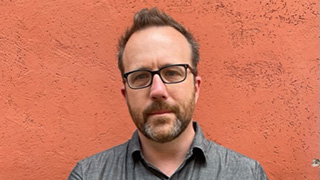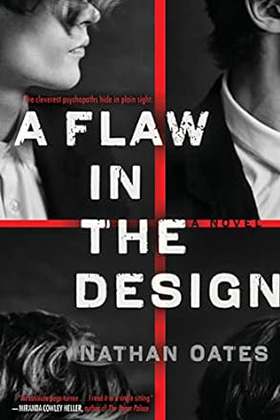Hiding in Plain Sight: Professor Nathan Oates Crafts a Thrilling Tale of Deception in New Novel, A Flaw in the Design
Thursday, December 7, 2023

Professor Nathan Oates
Professor and Director of Undergraduate Writing Studies Nathan Oates knows a thing or two about plot twists, and how to keep a reader on the edge of his or her seat. His new novel, A Flaw in the Design, is a psychological thriller published earlier this year by Penguin Random House to positive reviews in The New York Times, The Guardian, The Observer, and The Daily Mail. The book was soon optioned for development as a TV show by Carnival Films (a UK-based film company, best known for "Downton Abbey").
In it, the life of a writing professor is derailed when he becomes guardian of his very charming, but dangerous nephew, whose parents have suddenly and mysteriously died. Described as a "propulsive, edge-of-your-seat debut psychological thriller," and a "psychological thriller par excellence" by The Guardian, A Flaw in the Design was released in March 2023. It received high praise from fellow novelists, including the best-selling author of The Paper Palace, Miranda Cowley Heller, who called it "an absolute page-turner." Of it she wrote, "I read it in a single sitting."
Oates, who has a master’s degree from The Johns Hopkins University and a Ph.D. from the University of Missouri, teaches creative writing at Seton Hall and has been on sabbatical for the past year. He is returning to the University in the upcoming spring term. He cites Flannery O’Connor as a primary influence on his writing, having studied her work, picking it apart with great reverence so he could learn the best elements of writing psychological thrillers. He calls Stephen King a strong influence on his writing, too. As a teenager, Oates read the works of King and says "I became completely, and maybe unhealthily obsessed."
This dismayed his parents, who both had graduate degrees in English. His father was an English professor and would hand over books by Faulkner and F. Scott Fitzgerald. "I would reluctantly sometimes read them and sometimes pretend to read them," said Oates, "But really, I loved the thriller element of Stephen King."

A Flaw in the Design Book Cover
Oates says he wasn’t sure A Flaw in the Design would evolve into a novel. "When this book started, I thought it was going to be a short story," Oates said. "I wrote the first ten pages and I realized there was no possible way I could tell the story properly, but I didn't quite know how to tell it." At that time, he was teaching, applying for tenure, and recalls realizing he was too busy to write a novel.
While new to the novel arena, Oates is far from a novice. Previously, he wrote and published short stories. His debut collection, The Empty House, won the Spokane Prize, and his stories have appeared in The Missouri Review, Alaska Quarterly Review, Copper Nickel, West Branch, and The Best American Mystery Stories, among other highly respected and competitive literary publications. He honed his focus on the thriller genre during highly selective fellowships from The Writing Seminars at Johns Hopkins University, the University of Missouri, the New York State Summer Writers Institute, and the Sewanee Writers’ Conference.
"Toward the end of my Ph.D., right before I got hired at Seton Hall, I had a short story that was chosen for Best American Mystery Stories, and I had no idea that I had written a story that could qualify for that," said Oates, who was humbled by the experience. "And so, I thought, 'Well, people liked that story. Maybe I should like that kind of story. Maybe I should lean that way in my writing', so that's what I've been doing for the past decade leading into this novel."
Oates later took a leave for a year with his family in Florence, Italy. With a year off from teaching, the longest since he was 23, he thought, "If I'm ever going to write a novel, I'm going to do it now because I've never had this time before. Who knows when I'll have it again?"
The idea for A Flaw in the Design, he says, had been in his mind for a long time prior. "Stories or narratives work two ways for me. Either they arrive all in a rush, which is my preferred way, but it's rare, or they sort of sit and percolate and sort of float around in my mind, and I can't quite figure them out for years, often. This story was the latter."
Oates has long been fascinated with the idea of a character’s true nature, good and evil, and what happens when "the sort of badness that expresses itself sometimes in childhood was in fact their fundamental self, and that it sort of bloomed and blossomed." His character Matthew fits this profile.
His advice to his students who have aspirations of becoming novelists is to, "read as widely, variously, and capaciously as possible. That is how one learns how to write… always try to stretch your sense of what's possible with the sentence and story and find the way that people have done it. Study it and bring it back to your own work."
Categories: Education

